Small businesses are often short-handed yet never short of work. Check out my list of the 20 best small business tools of 2025 to find the best options for you.
Running a small business requires you to wear multiple hats. Between managing your employees and finances, there’s a lot to stay on top of.
Fortunately, small business tools can make your life much easier, In this article, I’m going over my top 20 picks of the best apps and software to make your small business run as efficiently as possible.
Our Top Picks
-
Connecteam is a cost-effective, easy-to-use, and customizable management tool for small businesses.
-

Good for creating virtual whiteboards
-

Good for time tracking
Why trust us?
Our team of unbiased software reviewers follows strict editorial guidelines, and our methodology is clear and open to everyone.
See our complete methodology
81
Tools considered
58
Tools reviewed
21
Best tools chosen
How I Chose the Best Small Business Tools
There are a ton of small business tools and software on the market, all of which may have vastly different functionalities. Here’s how I chose the tools on this list:
- Best in their category: I’ve broken down my list into categories based on different business needs. To make this list, I chose the tools that functioned the best in each category.
- Affordability: The software needs to be affordable and suit the budget of a small business.
- Scalable: The software on this list is designed to grow with small businesses as they scale.
- Not too technical: The majority of tools on this list can be learned without extensive training. However, some of the analytics tools may require tutorials or training to understand and use properly.
- Support: The software comes with good customer support to help you with any issues.
- Security: Strong security features are important to protect your business data. This includes data encryption, secure login processes, and regular security updates.
- Compliance and regulations: It’s important that tools for small businesses comply with any relevant industry regulations, especially concerning data protection and privacy laws.
Best Tools for Employee and Project Management
-
Connecteam — Best all-in-one employee management app
When it comes to managing your team, Connecteam is the best go-to solution.
Why I chose Connecteam: Connecteam has all the features you need to manage your staff right from your phone: create and share schedules, track employee hours, create and monitor tasks, communicate in real time, store important documents, and much more.
Here are some of the key features:
Easy-to-use employee scheduling tools
With Connecteam’s employee scheduling app, employees can submit time-off requests and their scheduling preferences directly on the app, and you get a complete overview of your team’s availability so you can prevent scheduling conflicts.
Additionally, you can share read-only schedules with clients through a sharable link, keeping them informed and up-to-date.
Connecteam also comes with employee scheduling templates so you don’t have to start from scratch every time. All employees receive immediate notifications on their mobile devices once the schedule is published. I also really like that Connecteam integrates directly with Google Calendar so employees can transfer their schedules to their personal calendars.
Additionally, you can share read-only schedules with clients through a sharable link, keeping them informed and up-to-date. Connecteam also enables you to share read-only schedules with clients through a sharable link, keeping them informed and up-to-date.

Track employee hours with a GPS-enabled time clock
With Connecteam’s time clock app, employees can all clock in and out of work right from their phones. The time clock is also enabled with GPS so you can see exactly where your employees are while they are working, making sure they only get paid while they’re on the job.
The app automatically creates employee timesheets and then sends them to you for approval at the end of the pay period by Connecteam’s timesheets app, saving you time on payroll and reducing the risk of costly errors.
Streamline employee communication
With Connecteam’s online team chat, you can communicate easily with your entire team from your phone with 1:1 and group chats.
Share company updates on the company newsfeed and provide easy access to everyone’s contact information with the company employee directory. You can also store important documents and training materials in the company knowledge base, ensuring that all important company information is at everyone’s fingertips.

Easy task and project management
Allocate one-time and recurring tasks in just a few clicks with Connecteam’s task management app. Then, set built-in reminders to make sure your employees perform their tasks on time.
Easily add detailed descriptions and subtasks, or attach images, files, and due dates. You’ll automatically receive progress updates in real-time as tasks are completed.
Integrations
Connecteam offers several integrations, including:
- Gusto
- Paychex
- RUN Powered by ADP®
- Quickbooks
- Xero
- Zapier
Ensure business success on the go
Besides these features, Connecteam comes with employee training software, digital forms and checklists to organize tasks and ensure compliance, time off management features, and more. It’s incredibly customizable and easy to learn how to use.
Connecteam’s paid plan starts at just $29 per month for up to 30 users, and small businesses with fewer than 10 users can access the app completely free.
Connecteam also offers a free for life plan – Try Connecteam here!
Key Features
Pros
Intuitive and easy to use
All-in-one solution
Great customer support
Budget-friendly
100% free plan for up to 10 users
Cons
Needs internet or wifi access to work
Pricing
Free-for-life plan availablePremium plans start at $29/month for 30 users
Streamline your small business operations with Connecteam!
Let’s Get Started -

ClickUp — Good for creating virtual whiteboards
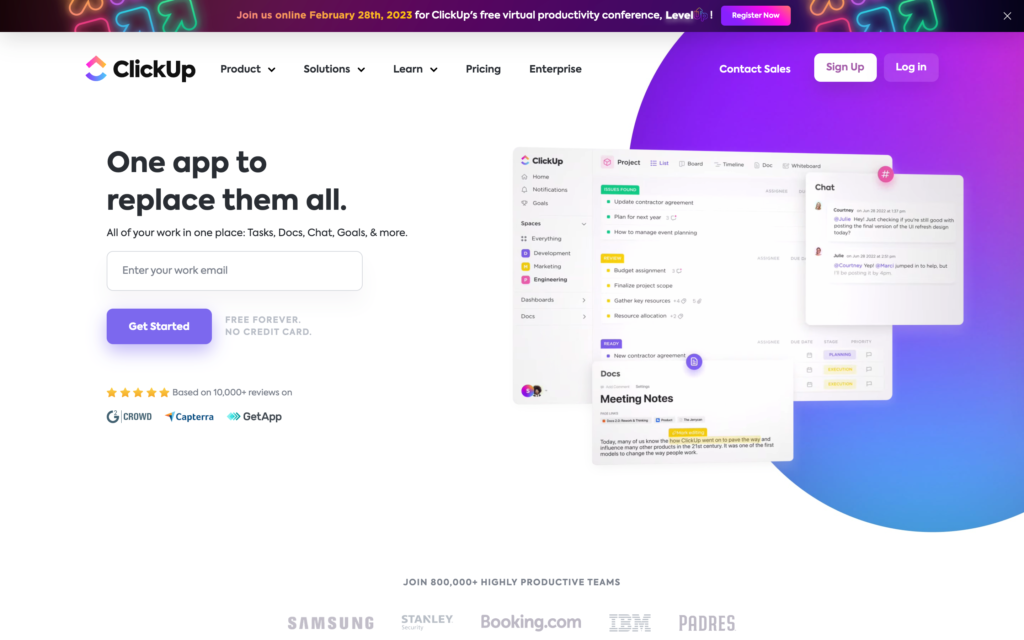
ClickUp stands out as an exceptional employee management app due to its versatile task management features that allow teams to easily customize workflows and track progress.
Why I chose ClickUp: I love the Whiteboard feature, an interactive visual space for teams to brainstorm, plan, and collaborate on projects in real-time.
This business tool also has a document creator where you can create, edit, and share documents with your team from your phone. You can add them to tasks and workflows, too, providing a creative way to share information with your team.
Key Features
- Task tracking
- Work chat
- Virtual whiteboard
- Gantt charts and Kanban boards
Pros
- Mobile app
- Imported and repeat tasks
Cons
- Time tracking is available only on more expensive plans
- No shift scheduling tools
Pricing
Starts at $7/member/month Trial: No Free Plan: Yes
-

Deputy — Good for time tracking
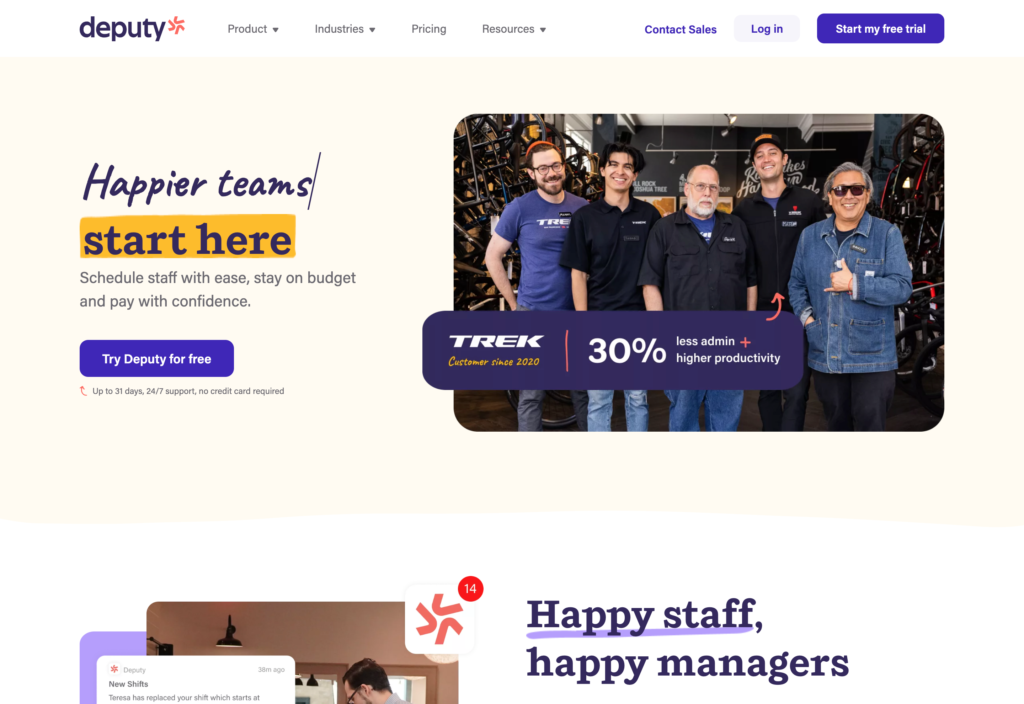
Deputy has lots of great features, but one of its standout features is its time-tracking capabilities.
Why I chose Deputy: Deputy allows you to effortlessly monitor employee hours and schedules, and track how long tasks take to complete.
The app is user-friendly and simplifies the process of shift planning and staff organization, making it a go-to tool for managers in various industries. Additionally, Deputy’s communication features and integrations with payroll systems help teams stay aligned, on track, and ensures everyone gets paid on time.
Key Features
- Automated scheduling
- Alerts and notifications
- Employee database
- Drag & drop features
Pros
- Good time management feature
- Several integrations
Cons
- Some bugs and technical issues with breaks
- There are more features and functionalities on the iOS app as opposed to Android
Pricing
Starts at $4.5/user/month, for Scheduling or Time & Attendance Trial: Yes — 31 days Free Plan: No
-
Wrike — Good for project management
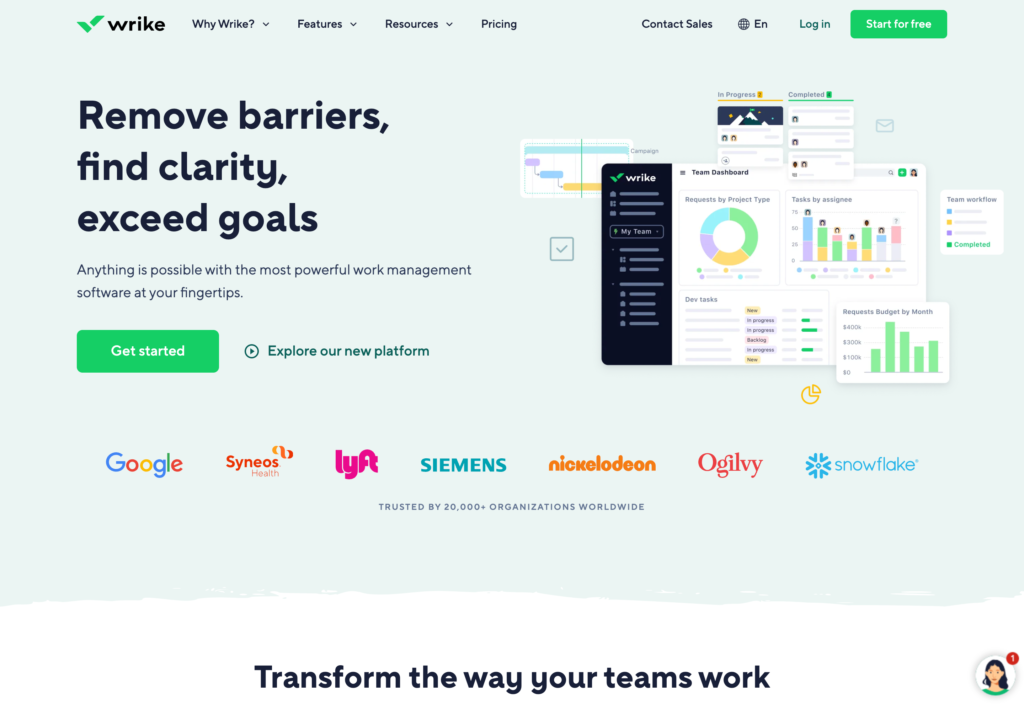
Wrike is a top free small business tool that allows you to analyze performance insights with clunky spreadsheets.
Why I chose Wrike: This software helps small businesses organize, plan, and track their projects and workflows. Its key features include customizable dashboards, real-time collaboration tools, and detailed reporting, which enable small teams to stay aligned, work efficiently, and meet their project goals effectively.
Key Features
- Backlog management
- Budgeting & forecasting
- Business process control
- Change management
Pros
- Feature-rich
- Good functionalities
Cons
- Unintuitive user experience
- Poor customer support
Pricing
Starts at $10/user/month, for 2-15 users Trial: Yes Free Plan: Yes
-

Proofhub — Good for creating project templates
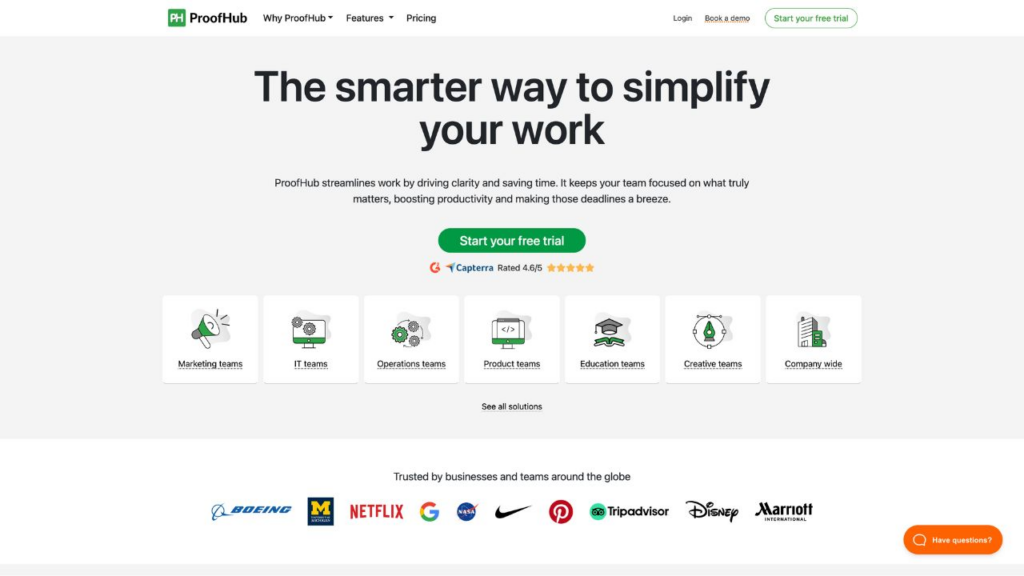
ProofHub is a comprehensive project management and team collaboration software.
Why I chose ProofHub: ProofHub is well-suited for small businesses looking to centralize their project planning and communication. It offers a range of features including task management, time tracking, file sharing, and an integrated proofing tool, which streamline workflow and enhance team productivity.
The simplicity of its interface, combined with flat-rate pricing, makes ProofHub an attractive choice for small businesses seeking an all-in-one solution to manage projects efficiently without worrying about user-based fees.
Key Features
- Project scheduling
- Productivity analysis
- Issue management
- Client Portal
Pros
- Feature-rich
- Good collaboration tools
Cons
- Unintuitive user experience
- Difficult to manage notifications
Pricing
Starts at $79/month Trial: Yes — 14-day Free Plan: No
-
Asana — Good for tracking deadlines

Asana offers detailed task assignments that allow managers to delegate work clearly, set priorities, and establish deadlines.
Why I chose Asana: The platform’s timeline view provides a visual representation of project schedules so teams can track progress and adjust plans in real-time. I also like how Asana’s project boards, which are reminiscent of Kanban boards, offer a flexible and interactive way to manage workflows.
It also offers integrations with other business tools like Slack, Google Drive, and Zoom, so it’s easy to incorporate into your business.Key Features
- Goal management
- Due date tracking
- Requirements management
- Resource scheduling
Pros
- Engaging user experience
- Intuitive interface
Cons
- Lacks recurring tasks functions
- Limited notification options
Pricing
Starts at $10.99/user/month Trial: No Free Plan: Yes — Up to 15 people
-

Zapier — Good for automation workflows
Available on
- Web

Zapier stands out because of its unique platform that automates tasks by connecting various apps.
Why I chose Zapier: Its primary feature, the creation of ‘Zaps’, allows users to set up triggers in one app that initiate actions in another, seamlessly linking over 3,000 apps like Gmail, Slack, and QuickBooks.
This automation extends from simple tasks, like sending email notifications based on specific triggers, to more complex workflows, such as updating databases or syncing calendars across different platforms.
For small businesses, this means significant time savings, reduced manual data entry, and improved efficiency. Zapier handles repetitive tasks, allowing teams to focus on business operations and strategy, instead.
Key Features
- ‘Zaps’ automate several tasks at once
- Create specific conditions for each Zap
- Formatting options
- Automate scheduling
Pros
- Incredibly customizable
- Works with over 3,000 apps
Cons
- Can get complex when automating several workflows at once
- Free plan offers limited tasks and workflows
Pricing
Starts at $19.99/month Trial: Yes Free Plan: Yes
Best Tools for Marketing
-

Hubspot — Good for its CRM
Available on
- Web
- iOS
- Android
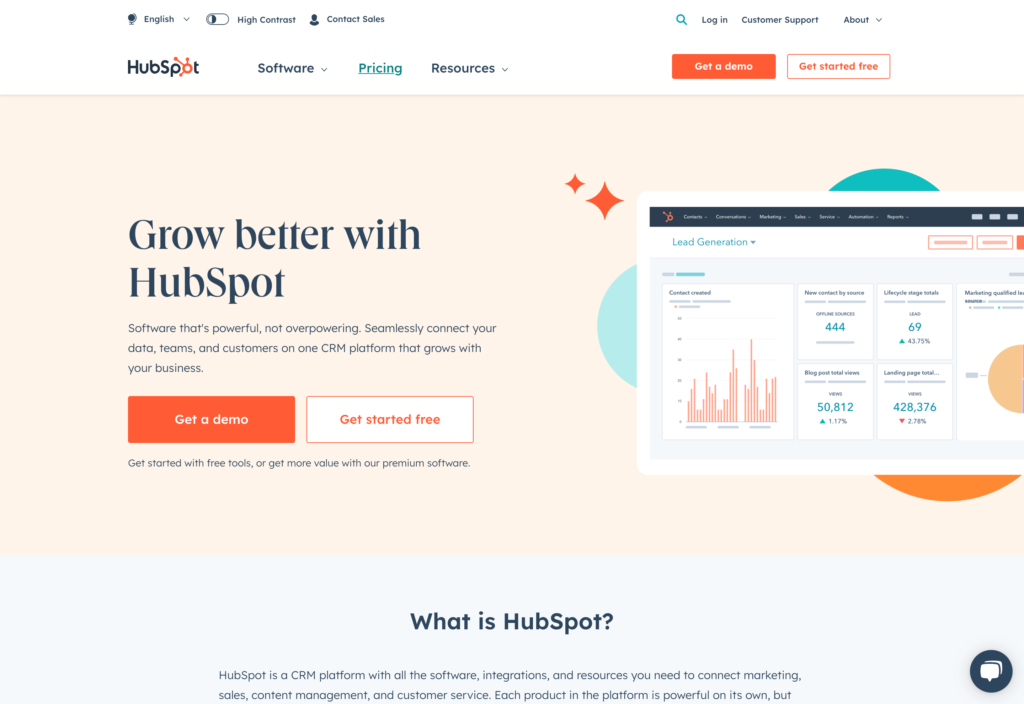
HubSpot offers an all-in-one platform for marketing, sales, and customer service under 6 hubs: operations, sales, CMS, marketing, commerce, and service.
Why I chose HubSpot: Hubspot’s main features include powerful CRM capabilities, email marketing tools, and analytics, which help businesses attract and retain customers. The user-friendly interface and scalable solutions make HubSpot ideal for small businesses looking to streamline their operations and grow their customer base without having to manage multiple systems.
Key Features
- Customer relationship management (CRM)
- Lead management
- Email marketing tools
- Customer portal
Pros
- Extremely feature-rich
- Over 500 integrations
Cons
- Free version has limited capabilities
- Steep learning curve due to large range of features
Pricing
Contact vendor for price Trial: Yes Free Plan: Yes
-

Omnisend — Good for SMS marketing
Available on
- Web
- Windows
- Mac
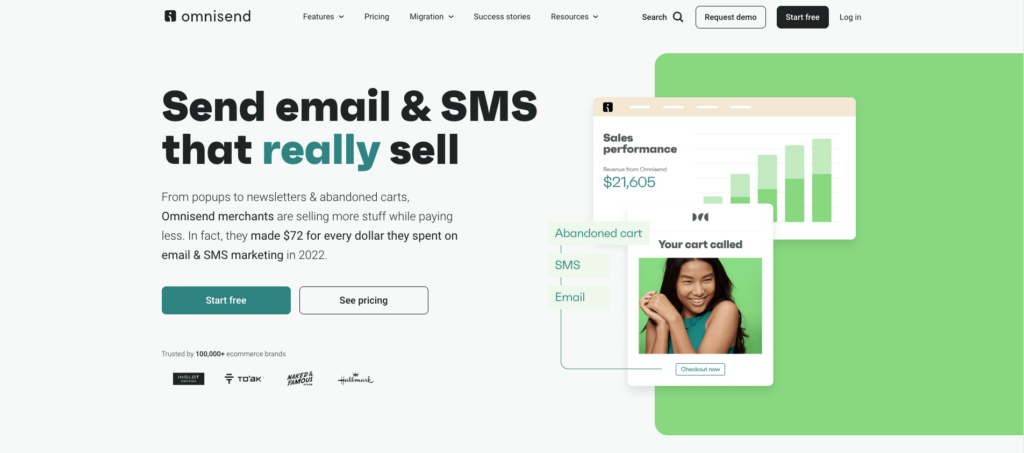
Omnisend is a highly effective marketing automation platform tailored for small businesses, particularly those in e-commerce.
Why I chose Omnisend: Omnisend’s standout features include advanced email marketing tools, SMS marketing capabilities, and easy-to-use automation, which allow businesses to create personalized and targeted campaigns.
The platform’s user-friendly interface and integration with popular e-commerce platforms make it an excellent choice for small businesses that want to boost their marketing efforts without needing extensive technical expertise.
Key Features
- Personalized, on-brand email campaigns
- Integrated SMS tools
- Email automation
- Pop ups and landing pages
Pros
- Easy to migrate contacts
- 130+ integrations
Cons
- Unlimited users and emails are offered only in the Enterprise plan
- Users report customer service could be improved
Pricing
Starts at $16/month Trial: Yes Free Plan: Yes
-

MailChimp — Good for email marketing
Available on
- Web
- iOS
- Android
- Windows
- Mac
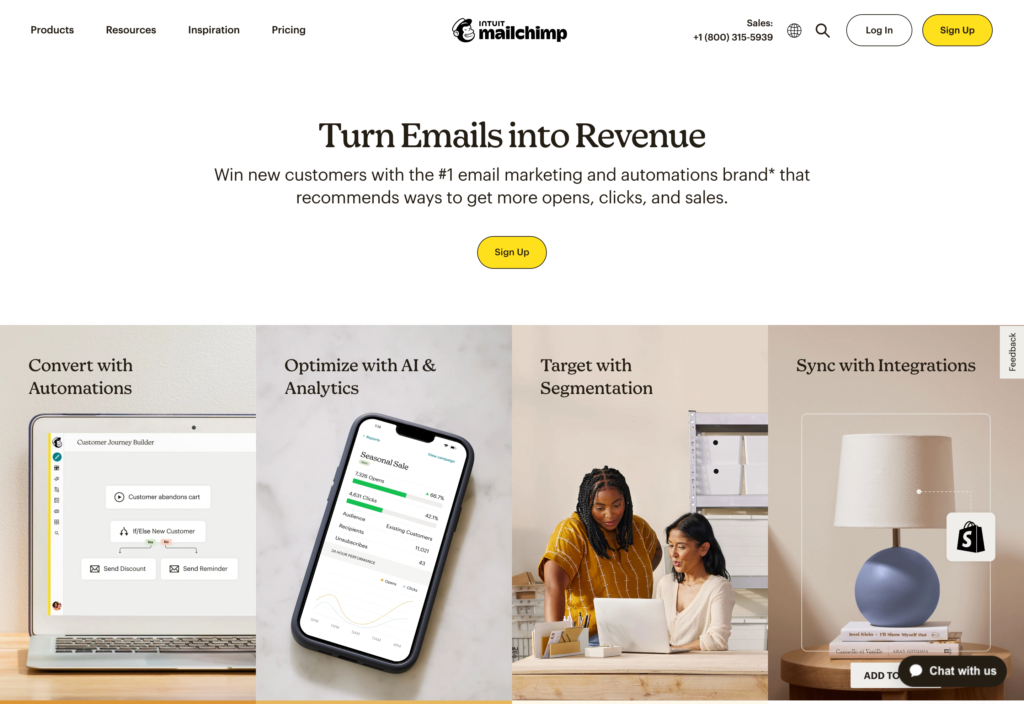
Mailchimp makes email marketing much easier.
Why I chose Mailchimp: Mailchimp offers user-friendly email marketing capabilities, with a range of features including customizable email templates, audience segmentation, and detailed analytics, which help businesses tailor their marketing efforts effectively.
Additionally, Mailchimp’s affordability and scalability, combined with its additional offerings like landing pages and social media ad management, make it a great and manageable marketing solution.
Key Features
- Email marketing
- Social media marketing
- Website builder
- Audience segmentation
Pros
- Comprehensive free plan
- User-friendly
Cons
- Limited automation in lower tiers
- Can get expensive as subscriber list or feature requirements grow
Pricing
Starts at $11/month, for up to 3 users Trial: Yes Free Plan: Yes
-
DocHipo — Good for creating on-brand documents
Available on

DocHipo is an AI-powered document design software that helps you create a variety of eye-catching on-brand content.
Why I chose DocHipo: DocHipo offers a massive collection of templates across various document types, from infographics to posters, flyers, social media posts, presentations, and brochures.
DocHipo is great for business users and non-designers. Its easy drag-and-drop editor, real-time collaboration, and integration with popular tools make it simple to work with even for inexperienced users.
It also offers various AI-powered tools that can convert an idea into a beautiful design with a snap of the fingers. These AI tools include AI writer, AI translator, AI image generator, AI background remover, and more.
Key Features
- Customizable Templates
- Easy navigation
- Premade Design Assets
- AI Tools
Pros
- Integrates with MailChimp and YouTube
- Intuitive drag-and-drop interface
Cons
- Free plan is limited to 5 documents
- Search function can be somewhat difficult to use
Pricing
Starts at 0$ Trial: No Free Plan: Yes
-

ReviewsOnMyWebsite — Good for review management
Available on
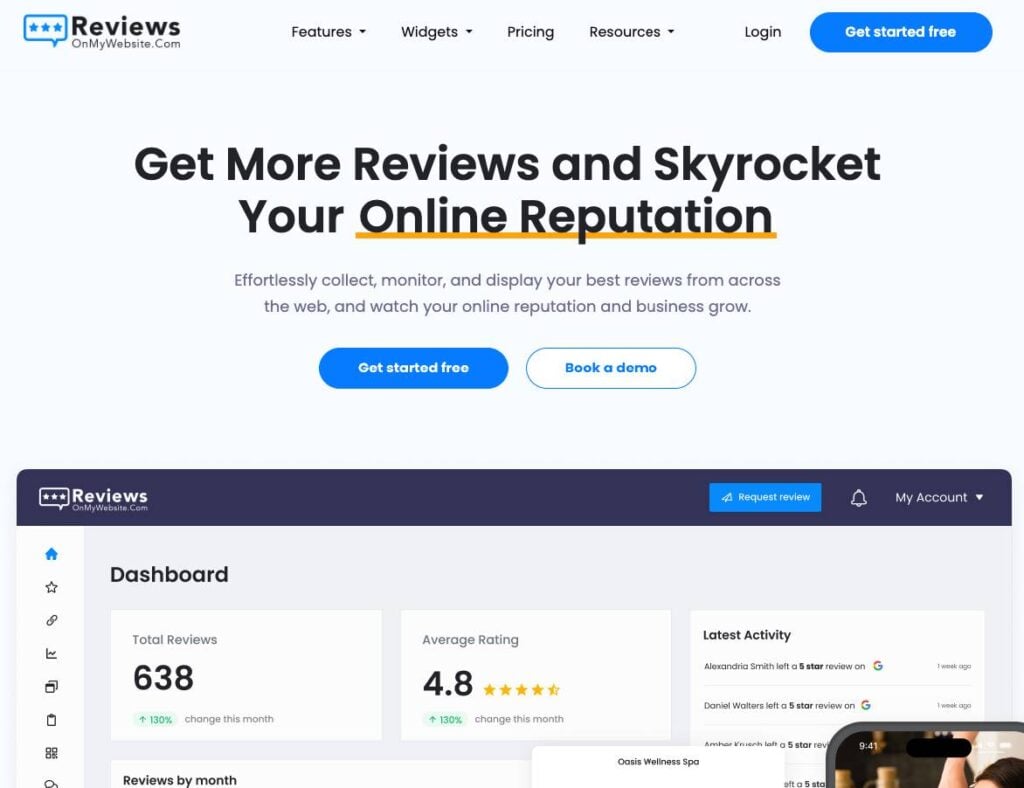
ReviewsOnMyWebsite is an online reputation management software designed to help businesses manage their customer reviews across platforms like Google, Facebook, and Yelp.
Why I chose ReviewsOnMyWebsite: ReviewsOnMyWebsite offers a suite of tools for managing a business’s online reputation. You can use it to reply to reviews across multiple platforms, display top customer reviews on your website, and generate more reviews through automated email and SMS campaigns.
Key Features
- Review management
- Website review widget
- Email and SMS campaigns
- Social sharing tools
Pros
- Supports all the popular review sites
- Allows you to respond to all reviews from one place
Cons
- Needs internet or wifi access to work
Pricing
Starts at $9/month Trial: Yes Free Plan: No
Best Tools for Payroll Processing
-
Gusto — Good for payroll automation
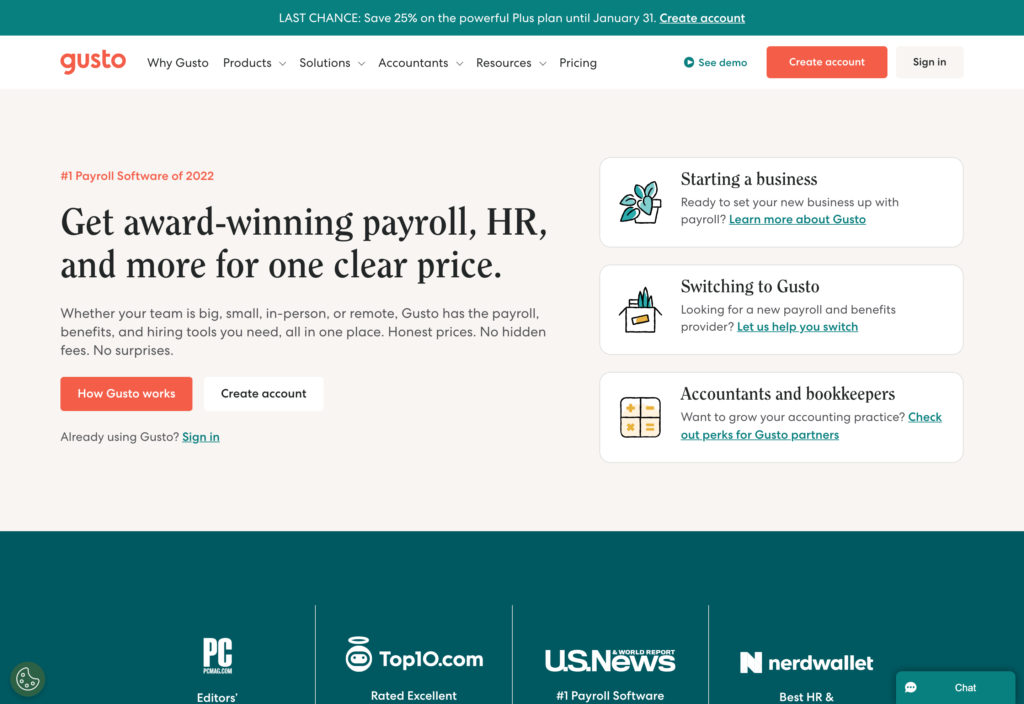
Gusto’s full-service payroll software aims to help small businesses take care of their teams.
Why I chose Gusto: It’s easy to run payroll each month for salaried employees and contractors. It also allows you to automatically file payroll taxes, manage healthcare and other employee benefits, perform next-day, 2-day, and 4-day direct deposits, and more.
Gusto is a good choice for business owners and entrepreneurs looking to minimize administrative hires.
Key Features
- Benefits management
- Check printing
- Direct Deposit
- Electronic forms
Pros
- Easy to use
- Feature-rich
Cons
- Poor customer support
- Limited reporting options
Pricing
Starts at $40/month + $6/person/month Trial: No Free Plan: No
-

QuickBooks Time — Good for automating state and federal tax filings

QuickBooks Time is a great accounting software solution that offers a range of features like invoicing, expense tracking, and financial reporting.
Why I chose QuickBooks Time: The user-friendly interface and cloud-based system allow for easy access and management of financial data from anywhere, enhancing flexibility for business owners. This small business tool integrates seamlessly with various business applications and provides real-time insights into cash flow, making it a valuable tool for small businesses looking to enhance financial management and strategic planning.
Key Features
- Automatic billing
- Billing and invoicing
- Expense tracking
- Payroll management
Pros
- Feature-rich
- Easy to use
Cons
- Learning curve
- Poor customer support
Pricing
Starts at $20/month + $10/user/month Trial: Yes — 30-day Free Plan: No
-
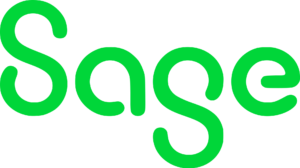
Sage Payroll — Good for real-time reporting
Available on
- Web
- iOS
- Android
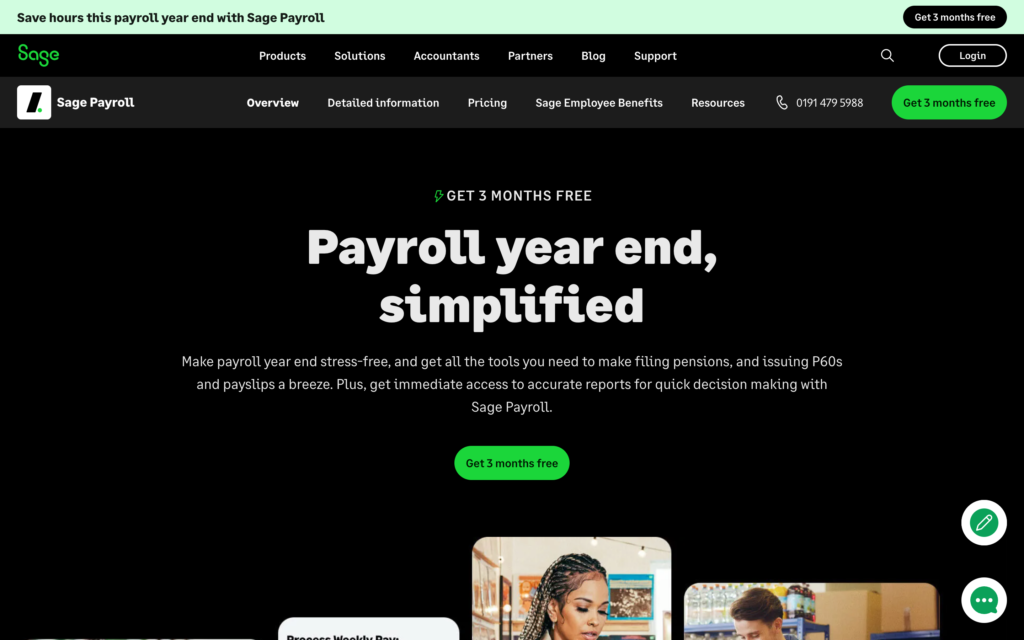
Sage simplifies your payroll process and provides accurate reports for quicker decision-making.
Why I chose Sage: Sage has a full suite of accounting and financial management tools, ideal for small businesses that want to streamline their financial processes. The app’s main features include invoicing, cash flow management, and real-time reporting.
This business tool provides financial oversight and helps small businesses manage their finances more efficiently.
Key Features
- ACA reporting
- Benefits management
- Check printing
- Compensation management
Pros
- Easy to use
- Easy to integrate
Cons
- Unintuitive user interface
- Poor customer service
Pricing
Starts at $8/month Trial: Yes Free Plan: No
Best Tools for Data Analytics
-

Google Analytics — Good for analyzing website behavior
Available on
- Web
- Android
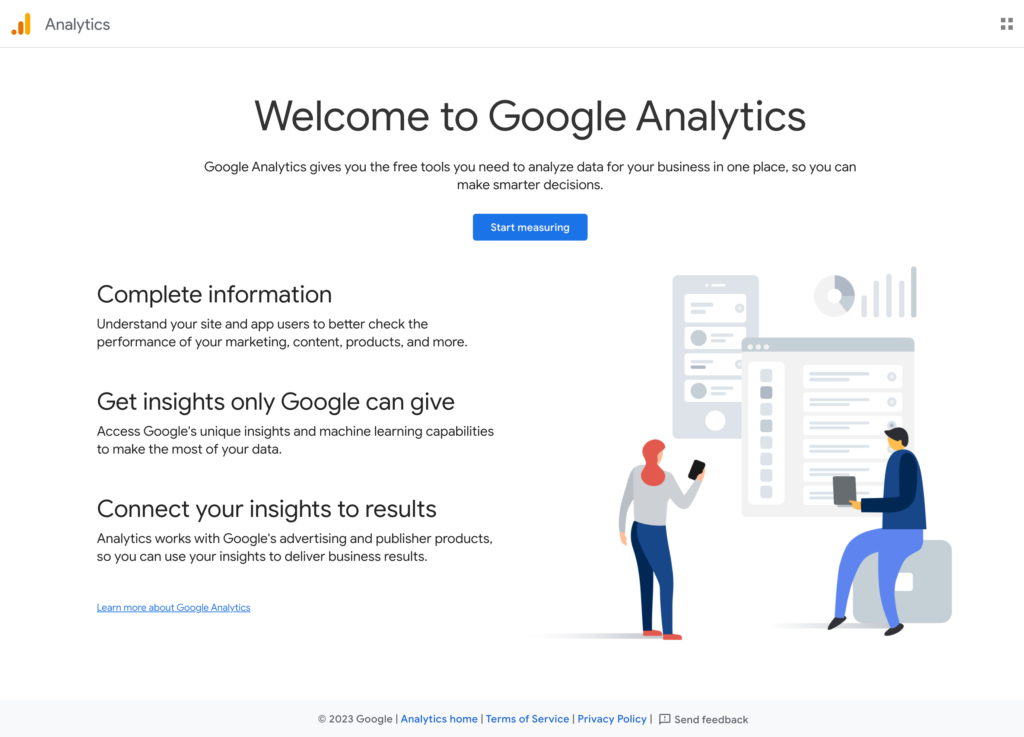
Google shows up on our list once again because its capabilities are wide in scope, not to mention, free.
Why I chose Google Analytics: Google Analytics is an indispensable tool for small businesses that want to gain insight into their website performance and customer behavior. It offers detailed data analysis features, including tracking user interactions, understanding traffic sources, and measuring conversion rates, which are crucial for optimizing online presence.
Specifically beneficial for small businesses, Google Analytics provides real-time reporting, audience segmentation, and goal tracking.
Key Features
- Data aggregation
- Website analytics
- Customer journey mapping
- Time-on-site tracking
Pros
- Easy to install
- Good reporting options
Cons
- Unintuitive user experience
- Difficult to learn
Pricing
Contact vendor for price Trial: No Free Plan: Yes
-

Tableau — Good for data visualization
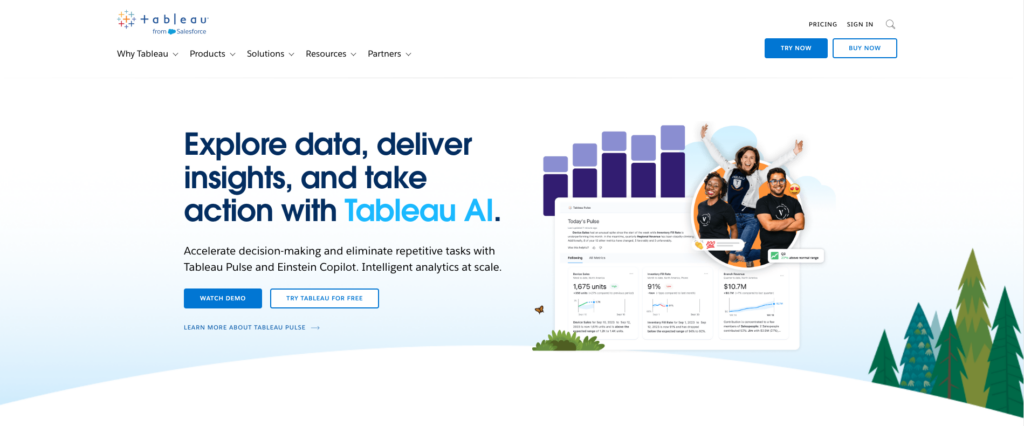
Tableau is a powerful data visualization tool that excels in transforming complex data sets into intuitive and interactive visual representations.
Why I chose Tableau: Tableau analyzes a wide range of data that are crucial for small businesses. It can track sales data, inventory levels, identify trends, and forecast future sales. Customer data can be analyzed to understand buying patterns, preferences, and demographics, which is important for targeted marketing and improving customer experiences.
Financial data such as expenses, revenues, and profits can be visualized for better financial planning and management. Additionally, Tableau can integrate web analytics data, providing insights into website traffic, user behavior, and online marketing campaign effectiveness.Key Features
- Data visualization
- Drag-and-drop interface
- Data connectivity
- Real-time data analysis
Pros
- Strong data connectivity
- Can collect at on of data and analyze is for you
Cons
- Steep learning curve - need extensive training to learn how to use
- Can be expensive for small businesses
Pricing
Starts at $15/month Trial: Yes Free Plan: Yes
-

GoodData — Good for creating analytic dashboards with AI
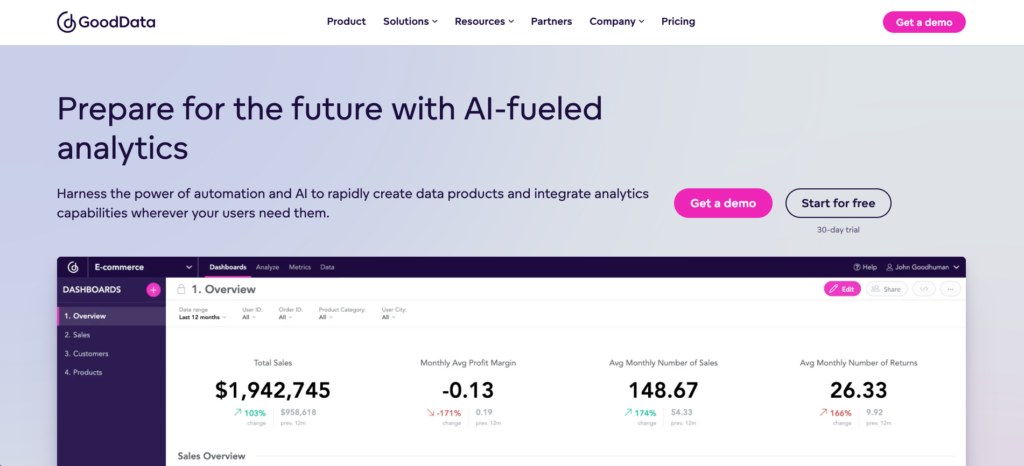
GoodData is a cloud-based analytics platform specifically designed for the unique needs of small businesses.
Why I chose GoodData: This software offers powerful yet accessible business intelligence tools. It integrates with multiple data sources, such as CRM systems, financial software, and marketing platforms, so small businesses can analyze diverse data sets in one place.
The platform’s standout features include customizable, interactive dashboards that provide real-time, actionable insights into key performance indicators like customer behavior and sales trends.Key Features
- AI-tool helps automate data analysis
- Data integration and management
- Great reporting
- Predictive analytics
Pros
- Scalable and secure
- More user-friendly than other analytics platforms
Cons
- Steep learning curve - need training to learn how to use
- Some users have reported performance issues when working with very large data sets
Pricing
Starts at $30/month Trial: Yes Free Plan: No
Best Website Builders
-
Wix — Good for drag-and-drop website building
Available on
- Web
- iOS
- Android

Wix is a highly user-friendly website builder that’s ideal for small businesses looking to establish a strong online presence without extensive technical knowledge.
Why I chose Wix: Wix offers a drag-and-drop interface, allowing you to easily customize website layouts, along with a large library of templates for various industries. Additionally, Wix includes features like SEO tools, e-commerce capabilities, and mobile optimization, which help small businesses reach a wider audience, sell products online, and ensure their websites are accessible on all devices.
Key Features
- Large template library
- Lots of apps you can add on to your site
- Easy to add extra pages to your site
- SEO tools
Pros
- Intuitive and easy to use
- No technical expertise needed
Cons
- Don’t need to know code to build a professional site
- Can’t switch templates
Pricing
Contact vendor for price Trial: No Free Plan: Yes
-

Squarespace — Good for beginners

Squarespace is a website builder known for its sleek design templates and easy-to-use interface.
Why I chose Squarespace: Squarespace stands out for its high-quality, customizable design templates that cater to a variety of business niches, from restaurants to retail, making sure that each website can have a unique and industry-appropriate aesthetic.
The platform is ideal for beginners with no technological background and it integrates with various third-party tools and applications, including social media platforms, marketing tools, and payment apps.
It also offers robust features such as responsive design for mobile compatibility, built-in SEO tools to enhance online visibility, and e-commerce functionality for seamless online selling.Key Features
- Integrated e-commerce platform
- Content management system (CMS)
- Appointment scheduling
- Analytics dashboard
Pros
- Excellent marketing features
- 24/7 customer support
Cons
- Doesn’t give full customizability with its basic editor
- Editor doesn’t autosave
Pricing
Starts at $23/month Trial: Yes Free Plan: No
-

Shopify Logo — Good for scaling your e-commerce store

If you have an online store, then Shopify may be a great business tool for you.
Why I chose Shopify: Shopify is a leading e-commerce website builder specifically designed for small businesses looking to establish and grow their online stores. It offers a comprehensive set of features including a user-friendly interface for creating and customizing online storefronts, integrated payment processing with support for multiple payment gateways, and robust inventory management tools. Shopify also provides valuable marketing and SEO tools, along with access to a vast app marketplace.
Key Features
- Integrated payment processing
- SEO tools
- Inventory management
- Marketing tools
Pros
- Very user friendly
- All-in-one solution for managing an online store
Cons
- Transaction fees can add up
- Limited customization without coding
Pricing
Starts at $39/month Trial: Yes Free Plan: No
Compare the Best Small Business Tools
| Topic |
 Start for free
Start for free
|

|

|
|

|
|

|

|

|

|
|

|
|

|

|

|

|

|
|

|

|
|---|---|---|---|---|---|---|---|---|---|---|---|---|---|---|---|---|---|---|---|---|---|
| Reviews |
4.8
|
4.7
|
4.6
|
4.3
|
4.6
|
4.5
|
4.7
|
4.5
|
4.7
|
4.5
|
4.3
|
N/A
|
4.6
|
4.7
|
4.8
|
4.7
|
4.5
|
4.4
|
4.4
|
4.6
|
4.5
|
| Pricing |
Starts at just $29/month for the first 30 users
|
Starts at $7/member/month
|
Starts at $4.5/user/month, for Scheduling or Time & Attendance
|
Starts at $10/user/month, for 2-15 users
|
Starts at $79/month
|
Starts at $10.99/user/month
|
Starts at $19.99/month
|
Contact vendor for price
|
Starts at $16/month
|
Starts at $11/month, for up to 3 users
|
Starts at 0$
|
Starts at $9/month
|
Starts at $40/month + $6/person/month
|
Starts at $20/month + $10/user/month
|
Starts at $8/month
|
Contact vendor for price
|
Starts at $15/month
|
Starts at $30/month
|
Contact vendor for price
|
Starts at $23/month
|
Starts at $39/month
|
| Free Trial |
yes
14-day
|
no
|
yes
31 days
|
yes
|
yes
14-day
|
no
|
yes
|
yes
|
yes
|
yes
|
no
|
yes
|
no
|
yes
30-day
|
yes
|
no
|
yes
|
yes
|
no
|
yes
|
yes
|
| Free Plan |
yes
Free Up to 10 users
|
yes
|
no
|
yes
|
no
|
yes
Up to 15 people
|
yes
|
yes
|
yes
|
yes
|
yes
|
no
|
no
|
no
|
no
|
yes
|
yes
|
no
|
yes
|
no
|
no
|
| Use cases |
Best all-in-one employee management app
|
Good for creating virtual whiteboards
|
Good for time tracking
|
Good for project management
|
Good for creating project templates
|
Good for tracking deadlines
|
Good for automation workflows
|
Good for its CRM
|
Good for SMS marketing
|
Good for email marketing
|
Good for creating on-brand documents
|
Good for review management
|
Good for payroll automation
|
Good for automating state and federal tax filings
|
Good for real-time reporting
|
Good for analyzing website behavior
|
Good for data visualization
|
Good for creating analytic dashboards with AI
|
Good for drag-and-drop website building
|
Good for beginners
|
Good for scaling your e-commerce store
|
| Available on |
Web
|
Web, iOS, Android
|
Web, Windows, Mac
|
Web, iOS, Android, Windows, Mac
|
Web, iOS, Android
|
Web, Android
|
Web, iOS, Android
|
What are Small Business Tools?
Small business tools help business owners manage their businesses efficiently. These tools have a wide range of functionalities, like financial management, customer relationship management (CRM), project management, marketing, employee scheduling, and communication.
They streamline processes, improve productivity, and facilitate the growth of small businesses by providing cost-effective, user-friendly, and scalable solutions tailored to the unique challenges and needs of smaller enterprises.
How Do Small Business Tools Work?
Small business tools are designed to make life easier for small business owners and their teams by automating and simplifying different parts of running a business. They usually come as easy-to-use apps or online platforms, letting you and your team handle things like finances, customer relationships, website building, employee management, projects, and marketing from anywhere.
They bring all your business tasks into one place, helping you stay organized, work smarter, and make better decisions without getting bogged down in the nitty-gritty details.
How Much Do Small Business Tools Cost?
The cost can vary widely depending on the software features and size of the business. Google Analytics, for instance, offers its basic services for free, which is ideal for small businesses looking to understand customer behavior without a significant investment.
Wix, a website builder, has various pricing tiers, starting from a basic free plan to more advanced plans that offer additional features like e-commerce capabilities, with prices increasing accordingly. Deputy, a workforce management tool, offers a free starter plan for up to 100 shifts per month, and its premium plans start at $4.50 per user per month, making it a scalable option for growing businesses.
Connecteam, known for its stellar employee management features, offers a unique small business plan that’s free for life for up to 10 users, with more advanced plans starting at only $29 per month for the first 30 users.
What are the Benefits of Small Business Tools?
Increased efficiency
Small business tools automate routine tasks, saving time and reducing the likelihood of errors, which leads to more efficient operations.
Improved organization
These tools help in organizing various aspects of business operations, from scheduling and task management to customer data and inventory, keeping everything streamlined and accessible.
Enhanced communication
Many small business tools facilitate better communication within teams and with customers, through features like integrated messaging, email marketing, and customer relationship management (CRM) systems.
📚 This may interest you: Check out Connecteam’s list of the best team communication apps.
Data-driven decision making
Tools like analytics and reporting software provide valuable insights into business performance, customer behavior, and market trends, aiding in informed decision-making.
Cost-effectiveness
By automating tasks and improving efficiency, these tools can reduce the need for additional staff and lower operational costs.
Scalability
As the business grows, these tools can adapt to changing needs, whether it’s handling more data, more customers, or more complex projects.
Enhanced customer experience
Tools that manage customer interactions, like CRMs and feedback systems, help in providing better service and understanding customer needs, leading to improved customer satisfaction.
Remote work capability
Many small business tools are cloud-based, allowing for remote access to business data and operations.
FAQs
The best business tool depends on your unique business needs, goals, and budget. If your goal is to better manage your team on the go, then Connecteam is a great option because it has tons of features built into one single app, like employee scheduling, time clock, HR capabilities, team communication, and more.
Small business tools are essential for streamlining operations, automating repetitive tasks, and efficiently managing various aspects of a business, from finances to customer relations. They provide valuable insights, enhance productivity, and support scalable growth, which are crucial for the success and competitiveness of small businesses.
The Bottom Line on Small Business Tools
Technology is certainly here to stay, and your small business can suffer without the right tools. By handling many time-consuming tasks that can bog down a small team, they enable small businesses to operate more efficiently, stay competitive, and grow.
With the 20 top tools we’ve explored, you now have the resources at your fingertips to tackle challenges head-on and carve out your own success story for your business.





